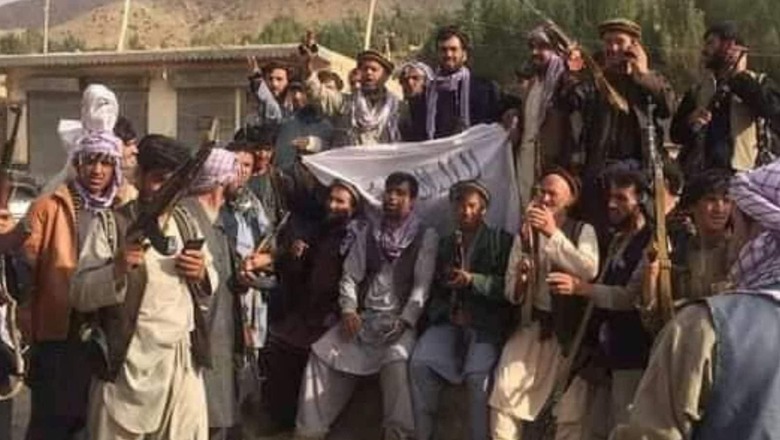
views
The Taliban, who have escalated efforts to form a new government in Afghanistan, are of the view that the Current Constitution of 2004 should be undone as it was framed under ‘foreign forces’. The new Taliban regime may restore the Constitution of 1964, sources told CNN-News18.
As the militant organisation resurrects the nation that has been in the throes of a long-standing humanitarian and economic crisis, here’s a look at the key pointers of the Afghanistan Constitution of 1964, with Basic Rights and Duties of the People, and how they are in complete contrast with the ground reality of the war-torn country.
Article 25: Equal rights Before the Law
The people of Afghanistan, without any discrimination or preference, have equal rights and obligations before the law.
Ground Reality: When the fundamentalist group ruled Afghanistan from 1996 to 2001 they imposed Sharia law, a strict interpretation of Islamic law which meant women could not work, girls were banned from attending school and women had to cover their faces in public and always be accompanied by a male relative if they wanted to leave their homes.
After talking over power a second time, the Taliban has made the following rules for women:
• Women should not be seen on the street unattended without a blood relative or a burka.
• Since no man should hear a woman’s footsteps, high-heeled shoes should not be worn by women.
• A woman’s voice should not be heard by a stranger when she is speaking loudly in public.
• In order to prevent women from being seen from the street, all windows on the ground and first floors of residential buildings should be painted over or covered with a screen.
• Women are prohibited from having their pictures taken, filmed, or displayed in newspapers or books or in stores or at home.
Article 26: Only Courts Can Punish, Torture Not Permissible
Liberty and dignity of the human being are inviolable and inalienable, says the Afghan constitution. “The State has the duty to respect and protect the liberty and dignity of the individual. No one may be punished except by the order of a competent court rendered after an open trial held in the presence of the accused,” it reads.
Torturing a human being is also not permissible under this constitution. “No one can torture of issue orders to torture a person even for the sake of discovering facts, even if the person involved is under pursuit, arrest or detentions or is condemned to a sentence. Imposing punishment incompatible with human dignity is not permissible.”
Ground Reality: Thousands of Afghans who recently fled the Taliban-captured cities in the north, narrated incidents of brutal treatment by the insurgents: bodies left in the streets, girls being kidnapped to become Taliban brides, and young men press-ganged into fighting.
During their first stint in power, too, — from 1996 until the September 11, 2001 — the Taliban earned notoriety for a strict interpretation of Islamic law that punished even petty crime with public floggings and executions.
Article 28: No one Can Search a Residence Without Permission
A person’s residence is inviolable. No one, including the State, can enter or search a residence without the permission of the resident or the orders of a competent court and in accordance with the conditions and procedure specified by the law.
Ground Reality: A journalist who recently fled from Afghanistan, has made some startling revelations about the Islamist group, including one that members of the Taiban are going house-to-house in search of women and girls over 15 for marriage.
Writing in The Dallas Morning News, journalist Hollie McKay, quoted an Afghan woman, saying, “She told me the Taliban have been going house-to-house, looking for women and girls over 15 for marriage. A month ago, insurgent members arrived on the doorstep of her friend’s home in Badakhshan, which fell to the group several months ago, looking for young brides. Fariha told me the story she heard from her friend.”
Article 29: Property cannot be Confiscated
Property is inviolable, states the country’s constitution, adding, “No one’s property can be confiscated except in accordance with the provision of the law and the decision of a competent court.”
Ground Reality: According to rights groups and researchers, the militant group’s return to power threatens Afghan women’s hard-won property rights, with thousands who fled their homes during the Taliban takeover at particular risk of losing their land and houses for good.
A Reuters report says that the Taliban imposed a strict Islamic law that largely denied women property rights during its 1996-2001 rule, but since then local authorities have been granting property titles to widows, divorced women and other female-led households. However, this time Taliban leaders have sought to present a more moderate face since seizing power, saying women’s rights will be protected under the framework of Islam, but campaigners fear the fragile progress on property titles will be set back.
Article 32: Afghan Citizens Can Assemble, Form Political Parties
The constitution had given all citizens the right to assemble unarmed, without prior permission of the state, for the achievement of legitimate and peaceful purposes, in accordance with the provisions of the law. The Constitution had no provision for democratic election and specified that the new ruler will be the ‘King’s’ descendant, thus nullifying the existence or use of a political party.
“Afghan citizens have the right to establish, in accordance with provisions of the law, associations for the realisation of material or spiritual purposes. Afghan citizens have the right to form political parties, in accordance with the terms of the law,” it says.
Ground Reality: Sources told CNN-News18 that the insurgents are designing a government based on Iran’s model – an Islamic republic where the Supreme Leader is the head of state and the highest-ranking political and religious authority even above the president. Taliban’s supreme leader Hibatullah Akhundzada — who has never made a public appearance and whose whereabouts have largely remained unknown – will most likely be the Supreme Leader, presiding over a Supreme Council of 11 to 72, sources added.
The governing body’s ‘Executive Branch’ will be headed by the Prime Minister who is most likely to be either one of Akhundzada’s deputies – Mullah Abdul Ghani Baradar, one of the co-founders of the Taliban, who now heads the political office of the insurgent group and is part of the negotiating team that the group has in Doha. Or Mullah Yakub, who is the son of Mullah Omar, who “manages ideological and religious affairs”.
Article 34: Education is Every Afghan’s Right, Govt Obliged to Provide it
The constitution says education is “the right of every Afghan” and shall be provided free of charge by the state and the citizens of Afghanistan. “The government is obliged to prepare and implement a program for balanced and universal education in Afghanistan. Primary education is compulsory for all children in areas where facilities for this purpose are provided by the State.”
Ground Reality: The Taliban’s acting higher education minister has said that Afghan women will be allowed to study at university but there would be a ban on mixed classes under their rule. “The… people of Afghanistan will continue their higher education in the light of Sharia law in safety without being in a mixed male and female environment,” Abdul Baqi Haqqani, the Taliban’s acting minister for higher education said at a meeting with elders, known as a loya jirga, said on Sunday.
He said the Taliban want to “create a reasonable and Islamic curriculum that is in line with our Islamic, national and historical values and, on the other hand, be able to compete with other countries”.
Read all the Latest News, Breaking News and Assembly Elections Live Updates here.


















Comments
0 comment